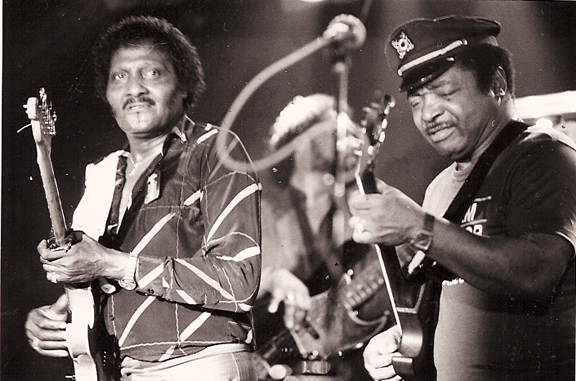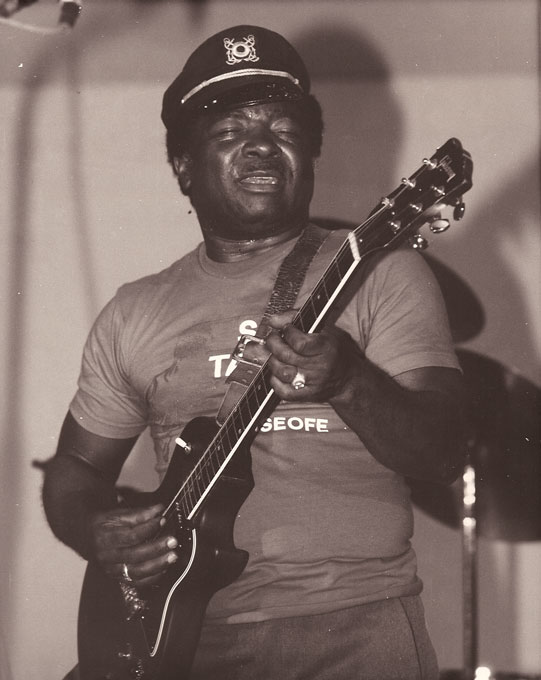|
Taylor made to sing the blues
By Tina Alvarez
Feb-March 1991
Entertainment Magazine
 Photo: Sam Taylor (R) with Albert Collins. Photo by Thomas J. Pennington 1989. Photo: Sam Taylor (R) with Albert Collins. Photo by Thomas J. Pennington 1989.
The problem with interviewing Sam Taylor is, where do you start?
For those of you who don't know, Blues Legend Sam Taylor is quite the modest celebrity. Born in 1934 in Mobile, Alabama, he comes from four generations of gospel singers, banjo pickers, minstrel players and vaudeville people.
"You're not a Taylor if you can't rock a little bit," he said, laughing. You gotta sing or something." And, with 13 children, 15 grandchildren and three great grandchildren, there must be a whole lotta shaking going on.
Sam, who lived in Mobile until he was 11, moved with his family to Brooklyn, New York, where he began a boxing career, which lasted 13 years.
"I truthfully wanted to be the champion of the world," he admitted. "I wanted to be a prize fighter. I didn't want to follow everyone else, you know?"
Sam had been singing gospel since he was three years old, but actively started singing during the last three years of his boxing career. In 1953 he joined the Air Force.
"I stayed there until 1957. It took me that long to realize that I was no soldier," he recalled. "I started pursuing a music career full-time and it's been that way ever since."
Sam has resided in Tucson for the last 11 years. Prior to that he had been living in the Los Angeles area for 13 years. So what made him decide to relocated to Tucson?
"Kidd Squidd -- the DJ from (Tucson, AZ. community radio station KXCI-FM)," he said without hesitation. "He was my neighbor in Venice, CA. He kept telling me, 'Sam, you need to come to Tucson.'" Sam eventually ventured into Tucson to play a gig and was impressed with the hospitality he received. The trip made him realize his true feelings.
"I really wanted to leave LA cause I got caught in the drug scene. I had to get out of there and try to save my life -- and here I am," he attested.
"Since April I've been here 11 years and since then I've been drug free. Just moving here turned my whole life around. This place has a special meaning for me."
In reciprocation, the line-up in the Sam Taylor Blues Band Featuring Heather Hardy, consists of violinist Heather Hardy, bassist Mike Nordberg, guitarist Brian Dean and drummer Jerome Kinsey. As far as recent albums go, Sam said they have a live CD they recorded while in
Europe last year. Another they recorded before they left for Europe, at the Rhythm room, should be out shortly, he said.
Speaking of band members, I mentioned the name of my illustrious boss, J.J. Terre (Phoenix publisher). "I don't know if you remember him," I began . . . "God Almighty!," he bellowed. "No, come on!"
"He used to play with you he told me."
"Why, he played with me in Venice," Sam recounted.
"Yeah, so tell me," I pried, "was he a good musician? I mean, spill some beans about him"
"He was a fine drummer, you know. He was a lady's man, but he was a good drummer," Sam declared. "He was quite, quite, quite the go-getter. He also played some with my son Bobby. He's quite a young man.
"I'm really proud of him," he continued, "because I can remember when his stuff was not that good, but he's always been a good musician. I saw him one time in all the years I've been here. He stopped by and he hasn't been by to see me since."
Sam has an illustrious background in the music scene. In the 50's he cut "Ain't That Some Shame" with Bobby Robbins who owned Fire and Fury Records. Also on that label was Ike and the Aces -- Ike Turner's band.
"Bobby's the guy that did "Danny May." He was the first guy to record Gladys Knight and the Pips," he reminisced. "He had Ruben and the Romantics, a lot of people. He had the biggest record company. He once had the number one, two and three songs on the R&B charts."
To his credit, Sam was in one of the first big integrated bands in the country, Joey Dee and The Starliters ("Peppermint Twist"), playing the Peppermint Lounge during the Twist Craze.
"I did a tour with the Beatles before they even came here," recollected Sam. "We were number one over here and they were number one over there. They were always asking me about Bo Diddley and stuff. When we got ready to leave after their tour, they came to the airport with us."
The Beatles told Sam they would love to perform in the United States.
"Joey (Dee) said to them, 'Dudes, you've got to come stay at my house, I've got room," continued Sam. "Within three months they were the hottest thing in the world. I haven't seen any of them since that day."
Blues With A Mission...
 Sam acknowledged that his mission in life is to put the blues in its rightful place, to have it respected.
Sam acknowledged that his mission in life is to put the blues in its rightful place, to have it respected.
"People think cause you say the blues, the music is going to be something that makes you feel bad. Nah. The blues takes your blues away," he explained. "It lets you know thereís someone else out there going through the things you are. It's a music of feeling. I can't cure all your ills, but youíll leave feeling better. I promise you that."
Bluesmen taught rock 'n roll musicians just about everything they know. When American and English musicians took R&B to heart in the '50's, no doubt itwas because it was a source ofinspiration as timeless as truth and as true, as time.
Evident in Sam's style, air-clearing blues chords are true grit in the hands of a true bluesman. A blues artist leaves nothing to be desired, everything to be had. A blues master is a guy who has been playing since he was old enough to cry. Sam creates sounds, heís not concerned about hitting notes. His sounds are as beautiful as they are emotional. He wastes no moments.
It took the English Invasion of 1964 to get American children of rock back to their blues heritage. Thanks to John Lennon, Mick Jagger and others, by 1968 there was a large blues revival. Citing more currents manes like Bonnie Raitt, Stevie Ray Vaughn and Eric Clapton, Sam credited white people with keeping the blues going. Sam pointed out that blues is making headway onto mainstream America, with major corporations like Miller, Budweiser, Goodrich and Jaguar utilizing the music in their advertisements. Older rock stars are releasing albums celebrating the blues roots of their styles. New groups like Bighead Todd and Toad the Wet Sprocket are aversion of pumped-up blues (As are Blues Traveler, The Black Crowes and even bands like Pearl Jam).
"It's been kind of hard getting the younger black kids to play the blues," he lamented. Perhaps a reason is that the blues go back to the Mississippi Delta of the post-civil war era and the music was attached to the social stigmatism of slavery.
"I'm really glad I stuck to my guns," Sam confessed. "I had people try to change me, like record companies. I've got to let it go the way the Lord gives it to me. I haven't changed. It's too late now."
Sam noted that he wrote a lot of songs for many people who made good money off of his work. He sold seven songs to the Rolling Stones, one of which they recorded -- "Midnight Rambler" -- a number that Sam says wasn't even the best in the bunch. In all, his songs have been covered by a diversity of people from Freddy King to Tiny Tim.
"I'm not bitter, because first of all, I haven't written my best stuff yet. I hope I never do," he conceded. "After I had that second open heart surgery I thought, I loved life before, but I really got me a romance with it now."
I saw the light ...
Sam received his first open heart surgery 15 years ago. When he was due for another one, he had to search for a doctor to operate on him. After the surgery, Sam was in the hospital for four months. For the majority of his stay he was on a respirator. At times, he felt like he wasn't going to make
it.
"I saw the light and somebody said, 'No, it ain't your time.' I felt the coolest calmness. I've been far enough that I know this -- there's something after this life," he verified, his eyes beaming. "Yeah, I've been there. I don't know how I got back."
In the hospital Sam was kept restrained because he kept trying to pull out the respirator and tubings. When he was untied, three finger on one hand, and two on the other were numb. He also had a tracheotomy and thought, between the two physical limitations, that he would never be able to play or sing again.
"They finally got me sitting up and I had my guitar in the he room," he described. Each day a special friend would come by and put his guitar on his lap.
"I couldn't play. I'd sit there and cry because I couldn't play and I didn't even want to live," he remembered. "I didn't think I was going to make it and it was real, real scary." But, as he was informed, he was intended to stick around for a time.
"Well, I've been around long enough," he stated quite frankly. "I have over 130 record songs. Spent most of my life playing for the people I was teaching."
Sam alluded to one singer he worked with, Maxine Brown, who wouldn't sing a song unless he did it first. If Sam could sing it, the she'd sing it.
Among the performers he's played with are Otis Redding, Sam and Dave, T-Bone Walker, Solomon Burke, Little Johnny Taylor and Big Joe Turner, who called him the Crown Prince of the Blues.
On a non-musical side, when Sam has some spare time, his favorite hobby is playing golf. At seven years of age he worked as a caddie and has been hooked ever since. In fact, during 1991 he won the Annual Tucson Amateur Championship.
However, Sam considers the biggest accomplishment in his life as becoming drug free. Either way you look at it, his victory overcoming substance abuse is just as admirable as his devotion to the blues.
"My advice would be to have a love for the music, let that be first," he emphasized. "I love what I'm doing. It's a gift and I'm thankful for that gift. Just wrap yourself into the gift, be thankful and it will grow by itself. Just keep learning, don't ever stop. I can listen to songs I recorded 20 years ago and the way I would do it now is a world of difference. Take your drive or your desire and thereís no telling how far you can go."
"If you quit, that's as far as you go," he continued. "I enjoy it when it comes out. Then you get it and it comes back to me again. I get more back. I hope I never lose that. Anytime I play, I play like I'm not gonna play no more because I don't know when my last one's gonna be. I've enjoyed myself, honey. I got my cookie."
"I've made some people feel good and it's great to have a gift that you can feel good about and can make someone else feel good," he concluded. "We're all Gold's children, but I'm one of God's miracles. I'm a rich man. I'm blessed."
- (Special Note: Bobby Taylor, Sam's son, died Monday, July 21, 1997 after a heart attack. Bobby, 39, was the leader of The Real Deal, a popular blues band.)
- We will miss Bobby.
© 1989EMOL.org. All rights reserved. Photos: Thomas J. Pennington, EM/1989
© 2009 EMOL.org Music Entertainment Magazine. All rights reserved.
|
Music Entertainment Magazine
Original Release Date: October 26, 1999
Number of Discs: 1
Label: Etherhaus
Track Listings
1. Blues Is Gonna Getcha - Sam Taylor, Kroh, Eddie
2. Live and You Learn
3. Back Against the Wall
4. Love's Last Stand
5. Ring My Bell
6. Justice
7. My Expectation
8. Enuff a Dat Stuff
9. Old Shoe
|
|
|
 Napster Napster
Free trial period. Napster Subscription ($9.95/month) offers access to over 5 million songs with unlimited downloads, and Napster To Go ($14.95/month) let’s Napster Subscribers transfer unlimited songs to their compatible MP3 player.
Napster.de: Music-Flatrate 7 Tage kostenlos testen! 
|
|
 Photo: Sam Taylor (R) with Albert Collins. Photo by Thomas J. Pennington 1989.
Photo: Sam Taylor (R) with Albert Collins. Photo by Thomas J. Pennington 1989. Sam acknowledged that his mission in life is to put the blues in its rightful place, to have it respected.
Sam acknowledged that his mission in life is to put the blues in its rightful place, to have it respected.